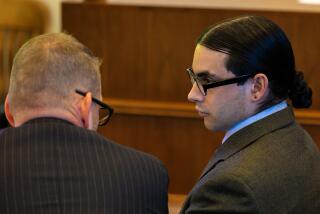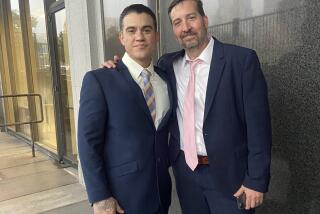Cut in Settlement Outrages Father of Slain Boy
- Share via
Ronald Allan Tolleson said he felt nine years of frustration evaporate in May when a jury ruled that West Covina police were partially responsible for his son’s death.
After eight years of legal maneuvering--even the state Supreme Court became involved--Tolleson felt vindicated by the verdict, which held that police botched the kidnap investigation of 10-year-old Ronnie Tolleson and contributed to the boy’s death.
On Monday, that all changed. Tolleson’s outrage returned when Pomona Superior Court Judge Robert A. Dukes reduced the jury’s award in the case from $5.74 million to $300,000. Tolleson said he would appeal the decision.
“(Dukes) has thrown every bit of justice that I could get for my son out the window,” Tolleson said. “That’s just a spit in the face.”
Legislation Urged
Although he “reluctantly” allowed the jury’s finding of fault to stand, Dukes urged the city to lobby for legislation that would reduce police liability in such cases.
In court, Dukes said it was clear that the jury was blinded by emotion, adding that he was shocked by the size of the award.
Dukes also urged the city’s attorney, Thomas J. Feeley, to lobby for legislation that would clarify the issue of special relationships between police and the public, on which the jury based its decision.
Police Chief Craig Meacham saw the judge’s ruling as partial vindication for himself and his department but had wanted Dukes to overturn the entire decision. In addition to the city’s overall liability, the jury held Meacham 20% liable for the death.
Decisions such as the Tolleson verdict could open up a Pandora’s box of police liability, Meacham said.
“It could happen that agencies . . . because they could not guarantee an agreeable result, would be in the position of asking (crime victims) for waivers or not providing police services,” he said.
Special Relationships
The state Supreme Court has held that special relationships exist when crime victims put their total trust in police based on the actions or assurances they receive from officers.
Tolleson has said that he did not question the scope of the investigation and that he put complete faith in police. At the time, he said he believed that the FBI was actively involved in the case. The father said he was told repeatedly by police that everything possible was being done to save Ronnie and that his son would be returned safely.
In 1980, a week after the abduction, the boy’s body was discovered at the residence of Danny Jerome Young, two doors from the Tolleson home. During the trial, medical examiners testifying for Tolleson said the boy may have been alive for several days.
In interviews after the verdict, jurors said they were alarmed that Young’s house was not fully searched even after he became the main suspect. Young was convicted of second-degree murder. Prosecutors did not prove that Young killed the boy himself, only that he was part of a conspiracy leading to the murder. No one else was ever convicted.
According to testimony from a retired police officer, Lt. William Flynn, Meacham rejected a request to conduct a more thorough search. Meacham has denied Flynn’s statement. Jurors also said they were shocked that Young was able to elude police at a ransom drop that was under surveillance.
Disregarded Testimony
In making their decision, jurors disregarded the testimony of Young, who said he killed Ronnie almost immediately after kidnaping the boy and before police were called in. Dukes said he disagreed with the jury’s ignoring of Young’s testimony.
More to Read
Sign up for Essential California
The most important California stories and recommendations in your inbox every morning.
You may occasionally receive promotional content from the Los Angeles Times.










